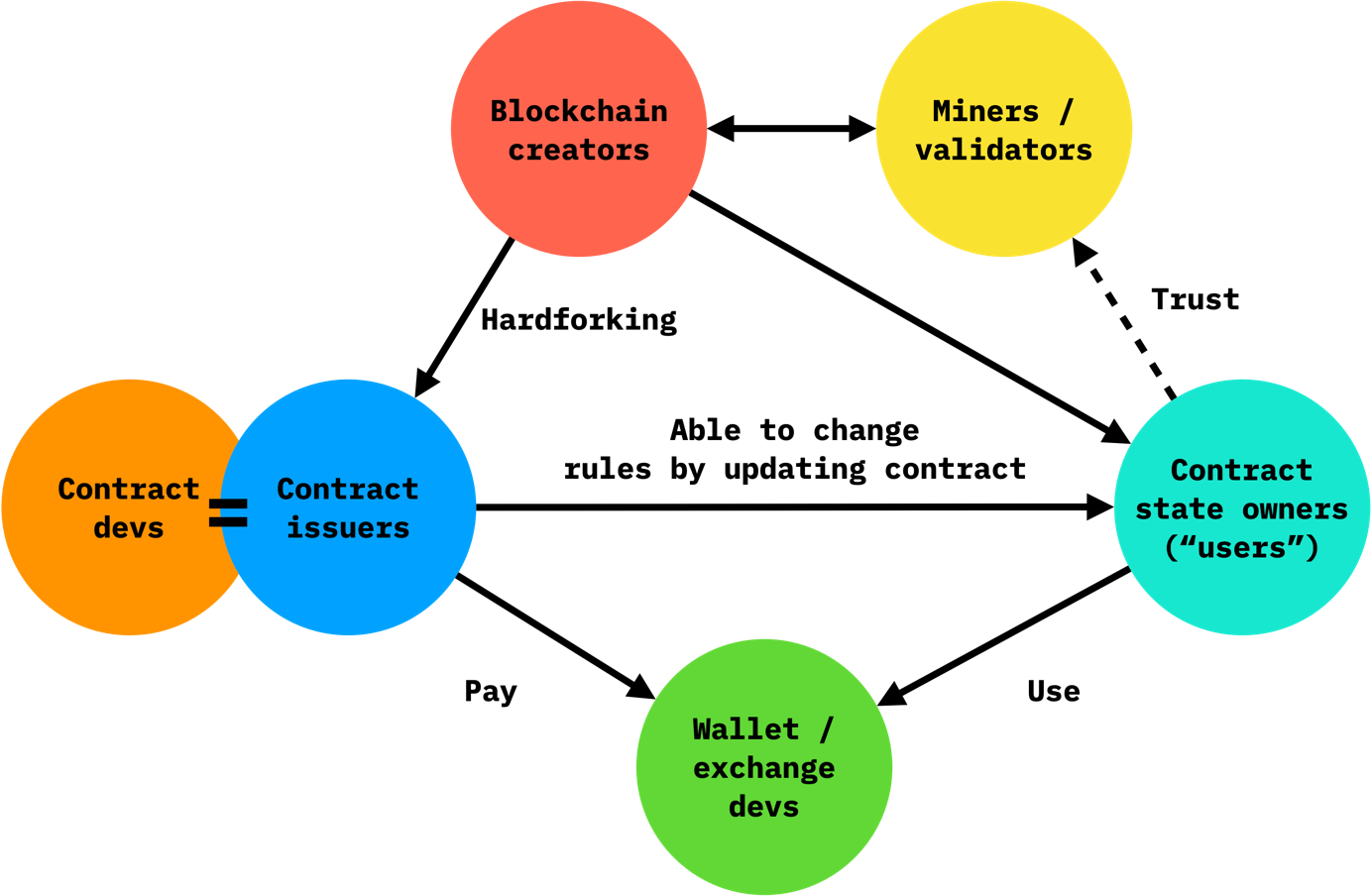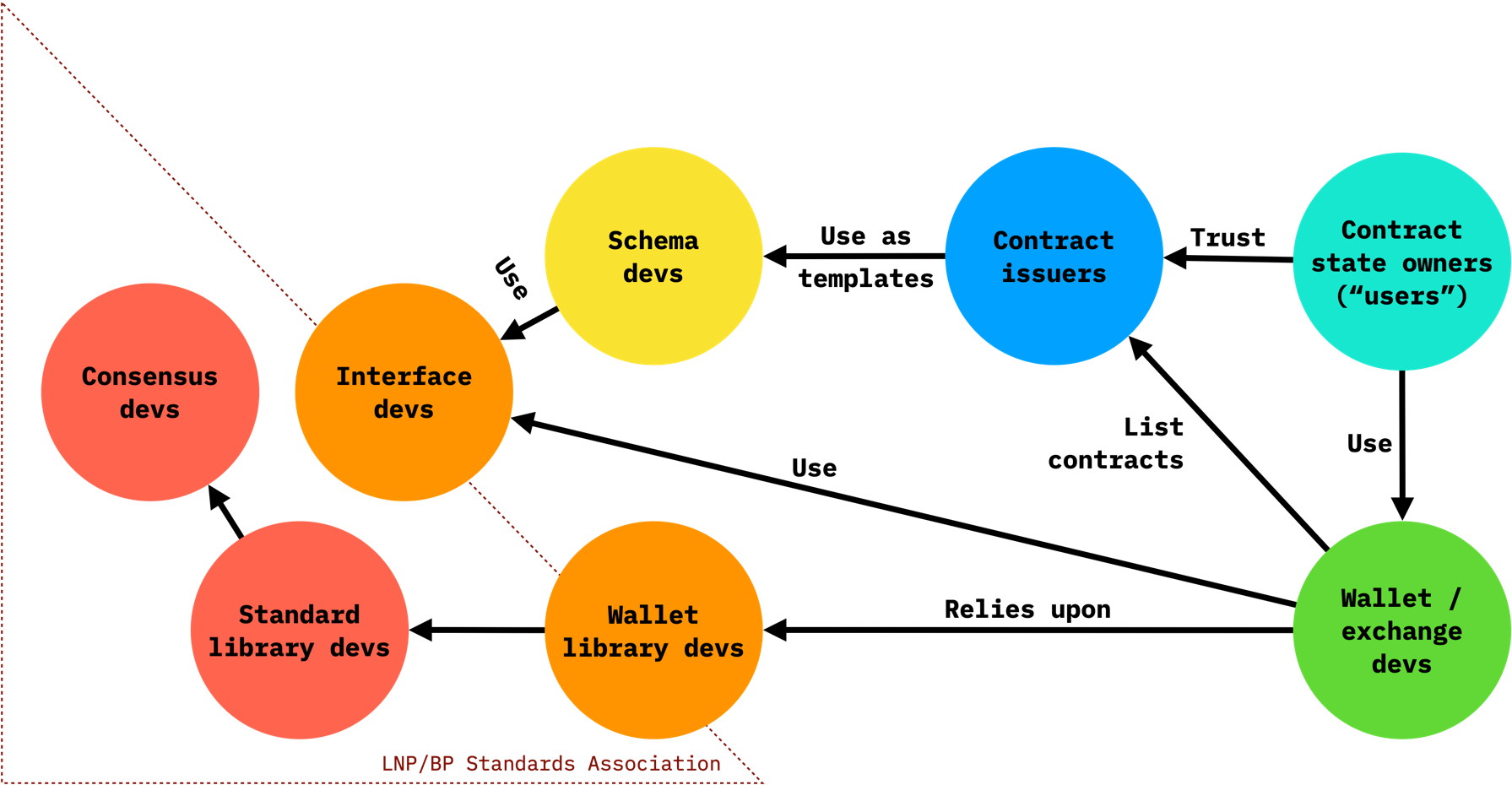Governance
Unlike in blockchain smart contract systems, where blockchain governance severely affects contract governance (contract transactions can be rolled back), in RGB the client-side validation contracts are immutable, fully governed according to the terms specified by contract issuers in contract genesis & schema and can't be changed/updated via changes to the RGB protocol stack.
Blockchain governance model

RGB governance model

RGB is a stack of protocols abstracted into a layered design with different governance structures and update policies:
Consensus & standards
The bottom level of RGB is the consensus layer, which is designed as an immutable protocol targeted for consensus level ossification.
Before the ossification happens all changes to RGB must be backward-compatible; such changes for client-side-validation are named fast-forwards. Development and deployment of fast-forward changes to the consensus level is performed by LNP/BP Standards Association.
Consensus level includes a set of RGB-related standards, also maintained by the LNP/BP Standards Association, named LNPBPs. They can be found in the standards repository, which contains also description for the standardization process and acceptance of the standard proofs & improvements.
It is strictly not recommended to use any alternative implementations of the RGB consensus level.
Standard libraries
Standard libraries is the lowest level for integration of RGB into other
software. Changes in standard libraries do not affect the safety of RGB assets
and security of contracts, however may break software compatibility. Thus,
this layer is maintained by [LNP/BP Standards Association][LNP/BP], which
ensures gradual changes and stability of APIs, alongside their improvements.
Standard libraries include:
- RGB standard library
- RGB data type library
- RGB AluVM libraries
Since the code in standard libraries may be used for a deep-level hacks, it is recommended that all users of RGB interact with the system via standard libraries reviewd by RGB working group of LNP/BP Standards Association.
Wallet libraries
Wallet libraries provide functionality such as constructing and processing RGB invoices, working with PSBT files containing RGB or other client-side-validated commitments, analyzing bitcoin and tapret wallet descriptors. While a reference implementation of RGB wallet library is provided by LNP/BP Standards Association written in Rust, other implementations may be used, based on different bitcoin wallet solutions (like BDK) or done in other languages.
Dev tools & languages
Developers use the RGB toolchain, which include compilers, linkers and packet managers. LNP/BP Standard Association currently develops and will be maintaining one of toolchain implementations, which include the Contractum language compiler and packager; however alternative toolchains may be independently created and used by other providers.
Node & command-line
RGB command-line tool and RGB node are two main user-facing tools which can be used by power users of RGB on desktops and server-side. They are developed and maintained by the LNP/BP Standards Association, but it is advised that alternative implementations will be written by independent bodies. These implementations may be audited by the Association to ensure compatibility.
Interfaces
Contract interfaces define an API between smart contracts and software (wallets, exchanges), allowing semantic-aware user interaction with arbitrary contracts.
LNP/BP Standards Association maintains standards and the registry for most-common used interfaces, named RGB-20, 21, 22 etc., however for independent vendors it is optional whether they'd like to standardize custom interfaces. Standardization of interfaces doesn't affect wallet compatibility; RGB standard libraries provide a way to work with any interfaces, even non-standard ones.
Contracts & schemata
Any independent party may issue an RGB contract or develop an RGB schema, which provides the business logic sharable by multiple contracts. No organization should standardize schemata and contracts; however an independent registry or safety scoring may exist. No governance is applied to this layer.
LNP/BP Standards Association
This organization plays an important role in bootstrapping RGB adoption and development of the RGB ecosystem. It runs as a Swiss non-profit association under article 40 of Swiss Civil Codex and governed by its members and member-elected persons. For the details of organization governance please refer to the official website.